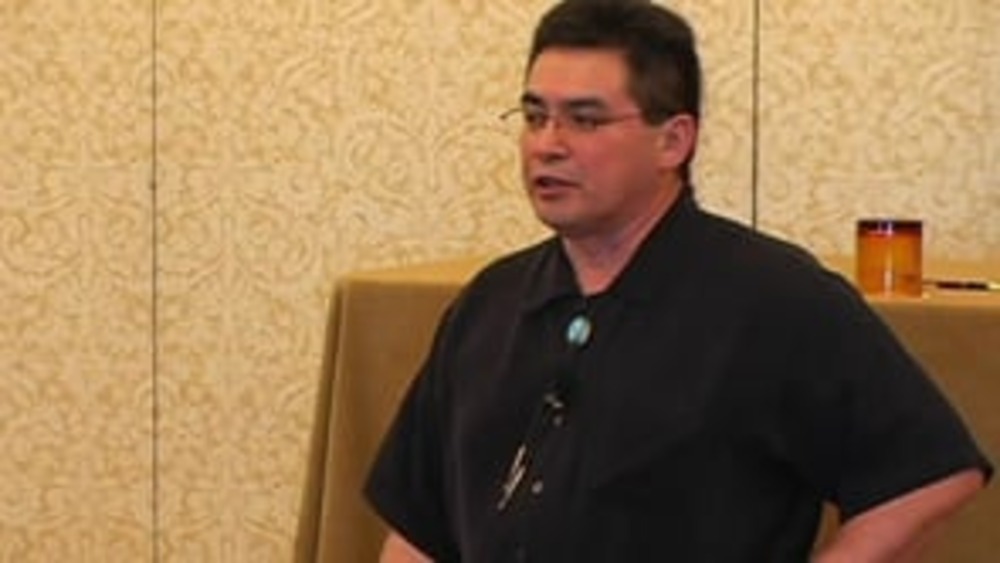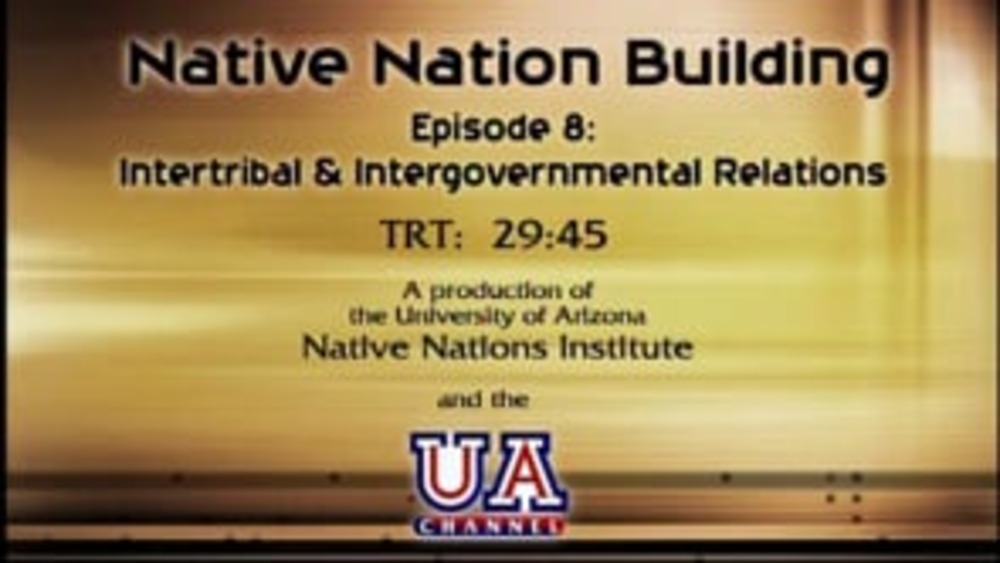Native leaders discuss the ways that intergovernmental agreements serve as important nation-building tools for Native nations, strengthening their sovereignty and jurisdiction in the process.
Additional Information
Cladoosby, Brian. Native Nations Institute for Leadership, Management, and Policy. University of Arizona. Tucson, Arizona. March 24, 2010. Interview.
Hicks, Sarah. "Intergovernmental and Intertribal Relations" (Episode 8). Native Nation Building television/radio series. Native Nations Institute for Leadership, Management, and Policy and the UA Channel, The University of Arizona. Tucson, Arizona. 2006. Television program.
Jordan, Paulette. Native Nations Institute for Leadership, Management, and Policy. University of Arizona. Tucson, Arizona. March 25, 2010. Interview.
Ninham-Hoeft, Patricia. Native Nations Institute for Leadership, Management, and Policy. University of Arizona. Tucson, Arizona. March 26, 2009. Interview.
Pecos, Regis. Native Nations Institute for Leadership, Management, and Policy. University of Arizona. Tucson, Arizona. June 17, 2008. Interview.
Sampsel, Roy. Native Nations Institute for Leadership, Management, and Policy, University of Arizona. Tucson, Arizona. August 31, 2010. Interview.
Transcript
Sarah Hicks:
"Well, these kinds of relationships really provide a way for tribal governments to extend their influence beyond their boundaries. It's really a way for tribal governments to leverage their influence, to bring their voice to the table with other governments to influence the policy making that's going on outside of their boundaries."
Brian Cladoosby:
"We've been creating intergovernmental agreements since 1855 at Swinomish when my grandfather's grandfather Kelkahltsoot signed the treaty with the U.S. government ceding vast acres of land to the U.S. government in exchange for some reserved rights and some promises that were put down on paper. So we have been, we are a government, and we have to be viewed as a government, and we have to look at other governments, and when we need to make agreements with them that benefit us and them, we have to do it. I don't see it as something that gets in the way of our sovereignty."
Paulette Jordan:
"A lot of that's recognition. They have to recognize you first as a sovereign entity. And that, I think, by that recognition, that's what strengthens who you are, and that's how it needs to be. If you don't allow that or if you limit that in any way, then yes, you're limiting your sovereignty, your inherent rights."
Regis Pecos:
"We consciously are regaining control by entering into this intergovernmental agreement with the Bureau of Land Management that makes us co-managers of lands that we will never afford to reacquire because of our financial situation and lack of financial resources. But we've used that intergovernmental agreement framework as a way to co-manage areas important to us. So that's probably one of the best examples that underscores how you can use that tool or that mechanism...Because now we're co-managers of these lands, and if we did not fully exercise our powers and authorities in this kind of creative way, in a very conscious way, that is a very significant part of our articulated vision of how we engage other governments for that purpose, we would not, today, have access to [those] places. In fact, we'd be trespassing upon those lands as we have historically."
Patricia Ninham-Hoeft:
"So one tool that my tribe has used are service agreements. And they enter into these agreements, or intergovernmental agreements, with local municipalities to figure out how to share in providing services to the area and to our community. So, for example, in Oneida we live so close to the city of Green Bay and some other villages, and they provide services that are important to us. For example, there's an airport that's across from our casino and it's run by the county. We depend on roads to be maintained and plowed right away when there's bad weather. And at the end of the day, those services have to be paid for by somebody. And so a tribe can say, 'We're not allowed to be taxed by another jurisdiction.' But those services still have to get provided and someone still has to pay for them. And so entering into an intergovernmental agreement or service agreement with a municipality is an exercise of sovereignty, that we are going to help provide for that service. We may not actually provide it ourselves but we may help pay for it through that kind of an agreement."
Roy Sampsel:
"I think if they are written with the understanding that they are trying to create an atmosphere in which a common product and consensus, if you will, can be reached is particularly important...I agree with the tribal leaders that are recognizing these as governance tools, as a means by which to exercise and implement their sovereignty and their nation building desires. Local governments, I think, are coming to the same conclusion."



